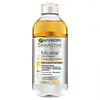What's inside
What's inside
 Key Ingredients
Key Ingredients

 Benefits
Benefits

 Concerns
Concerns

 Ingredients Side-by-side
Ingredients Side-by-side

Water
Skin ConditioningIsododecane
EmollientGlycerin
HumectantC15-19 Alkane
SolventCoco-Caprylate/Caprate
EmollientSodium Chloride
MaskingPhenoxyethanol
PreservativeTrisodium EDTA
Isopropyl Palmitate
EmollientCaprylyl/Capryl Glucoside
CleansingBenzethonium Chloride
AntimicrobialRosa Damascena Flower Water
MaskingPotassium Sorbate
PreservativeSodium Benzoate
MaskingSorbic Acid
PreservativeSodium Sulfate
Linalool
PerfumingGeraniol
PerfumingCitronellol
PerfumingLimonene
PerfumingMethyl Benzoate
PerfumingBHT
AntioxidantTocopherol
AntioxidantParfum
MaskingCI 16035
Cosmetic ColorantCI 61570
Cosmetic ColorantWater, Isododecane, Glycerin, C15-19 Alkane, Coco-Caprylate/Caprate, Sodium Chloride, Phenoxyethanol, Trisodium EDTA, Isopropyl Palmitate, Caprylyl/Capryl Glucoside, Benzethonium Chloride, Rosa Damascena Flower Water, Potassium Sorbate, Sodium Benzoate, Sorbic Acid, Sodium Sulfate, Linalool, Geraniol, Citronellol, Limonene, Methyl Benzoate, BHT, Tocopherol, Parfum, CI 16035, CI 61570
Water
Skin ConditioningCyclopentasiloxane
EmollientIsohexadecane
EmollientArgania Spinosa Kernel Oil
EmollientBenzyl Alcohol
PerfumingBenzyl Salicylate
PerfumingButyl Methoxydibenzoylmethane
UV AbsorberCI 60725
Cosmetic ColorantDecyl Glucoside
CleansingDipotassium Phosphate
BufferingDisodium EDTA
Ethylhexyl Methoxycinnamate
UV AbsorberEthylhexyl Salicylate
UV AbsorberGeraniol
PerfumingHaematococcus Pluvialis Extract
AntioxidantHexylene Glycol
EmulsifyingLimonene
PerfumingLinalool
PerfumingPentaerythrityl Tetra-Di-T-Butyl Hydroxyhydrocinnamate
AntioxidantPolyaminopropyl Biguanide
PreservativePotassium Phosphate
BufferingSodium Chloride
MaskingParfum
MaskingWater, Cyclopentasiloxane, Isohexadecane, Argania Spinosa Kernel Oil, Benzyl Alcohol, Benzyl Salicylate, Butyl Methoxydibenzoylmethane, CI 60725, Decyl Glucoside, Dipotassium Phosphate, Disodium EDTA, Ethylhexyl Methoxycinnamate, Ethylhexyl Salicylate, Geraniol, Haematococcus Pluvialis Extract, Hexylene Glycol, Limonene, Linalool, Pentaerythrityl Tetra-Di-T-Butyl Hydroxyhydrocinnamate, Polyaminopropyl Biguanide, Potassium Phosphate, Sodium Chloride, Parfum
 Reviews
Reviews

Ingredients Explained
These ingredients are found in both products.
Ingredients higher up in an ingredient list are typically present in a larger amount.
Geraniol is used to add fragrance/parfum to a product. It is the main component of citronellol. It is a monoterpenoid and an alcohol.
Monoterpenes are naturally found in many parts of different plants.
Geraniol can be found in many essential oils including Rose Oil and Citronella Oil. The scent of Geraniol is often described as "rose-like". Many foods also contain Geraniol for fruit flavoring.
Geraniol can irritate the skin when exposed to air. However, irritation depends on the ability of geraniol to penetrate into the skin. In general, geraniol is not able to penetrate skin easily.
Geraniol is colorless and has low water-solubility. However, it is soluble in common organic solvents.
Like citronellol, it is a natural insect repellent.
2,6-Octadien-1-ol, 3,7-dimethyl-, (2E)-
Learn more about GeraniolLimonene is a fragrance that adds scent and taste to a formulation.
It's found in the peel oil of citrus fruits and other plants such as lavender and eucalyptus. The scent of limonene is generally described as "sweet citrus".
Limonene acts as an antioxidant, meaning it helps neutralize free radicals.
When exposed to air, oxidized limonene may sensitize the skin. Because of this, limonene is often avoided by people with sensitive skin.
The term 'fragrance' is not regulated in many countries. In many cases, it is up to the brand to define this term. For instance, many brands choose to label themselves as "fragrance-free" because they are not using synthetic fragrances. However, their products may still contain ingredients such as essential oils that are considered a fragrance.
Learn more about LimoneneLinalool is a fragrance and helps add scent to products. It's derived from common plants such as cinnamon, mint, citrus, and lavender.
Like Limonene, this ingredient oxidizes when exposed to air. Oxidized linalool can cause allergies and skin sensitivity.
This ingredient has a scent that is floral, spicy tropical, and citrus-like.
Learn more about LinaloolParfum is a catch-all term for an ingredient or more that is used to give a scent to products.
Also called "fragrance", this ingredient can be a blend of hundreds of chemicals or plant oils. This means every product with "fragrance" or "parfum" in the ingredients list is a different mixture.
For instance, Habanolide is a proprietary trade name for a specific aroma chemical. When used as a fragrance ingredient in cosmetics, most aroma chemicals fall under the broad labeling category of “FRAGRANCE” or “PARFUM” according to EU and US regulations.
The term 'parfum' or 'fragrance' is not regulated in many countries. In many cases, it is up to the brand to define this term.
For instance, many brands choose to label themselves as "fragrance-free" because they are not using synthetic fragrances. However, their products may still contain ingredients such as essential oils that are considered a fragrance by INCI standards.
One example is Calendula flower extract. Calendula is an essential oil that still imparts a scent or 'fragrance'.
Depending on the blend, the ingredients in the mixture can cause allergies and sensitivities on the skin. Some ingredients that are known EU allergens include linalool and citronellol.
Parfum can also be used to mask or cover an unpleasant scent.
The bottom line is: not all fragrances/parfum/ingredients are created equally. If you are worried about fragrances, we recommend taking a closer look at an ingredient. And of course, we always recommend speaking with a professional.
Learn more about ParfumChances are, you eat sodium chloride every day. Sodium Chloride is also known as table salt.
This ingredient has many purposes in skincare: thickener, emulsifier, and exfoliator.
You'll most likely find this ingredient in cleansers where it is used to create a gel-like texture. As an emulsifier, it also prevents ingredients from separating.
There is much debate on whether this ingredient is comedogenic. The short answer - comedogenic ratings don't tell the whole story. Learn more about comegodenic ratings here.
The concensus about this ingredient causing acne seems to be divided. Research is needed to understand if this ingredient does cause acne.
Scrubs may use salt as the primary exfoliating ingredient.
Learn more about Sodium ChlorideWater. It's the most common cosmetic ingredient of all. You'll usually see it at the top of ingredient lists, meaning that it makes up the largest part of the product.
So why is it so popular? Water most often acts as a solvent - this means that it helps dissolve other ingredients into the formulation.
You'll also recognize water as that liquid we all need to stay alive. If you see this, drink a glass of water. Stay hydrated!
Learn more about Water